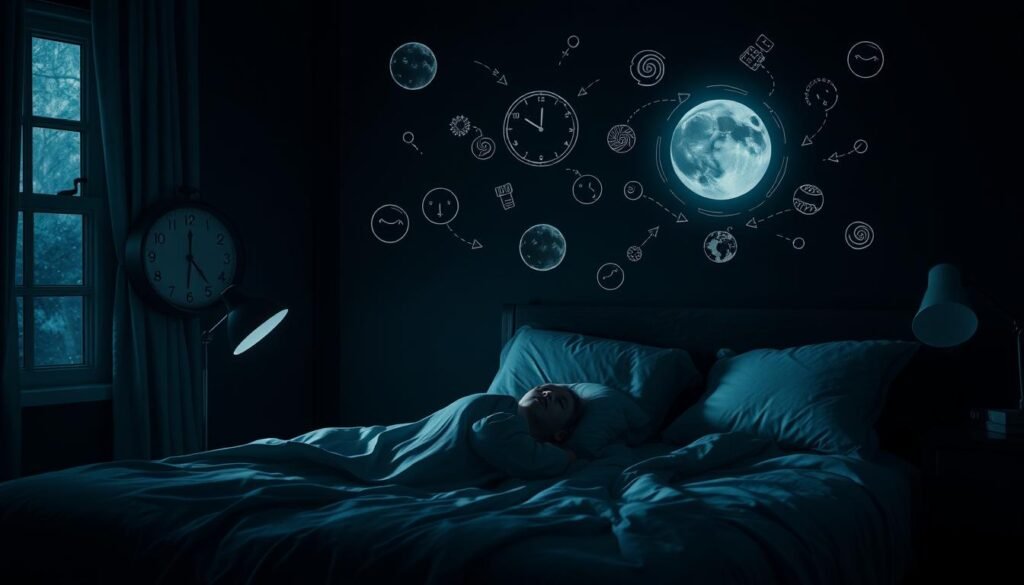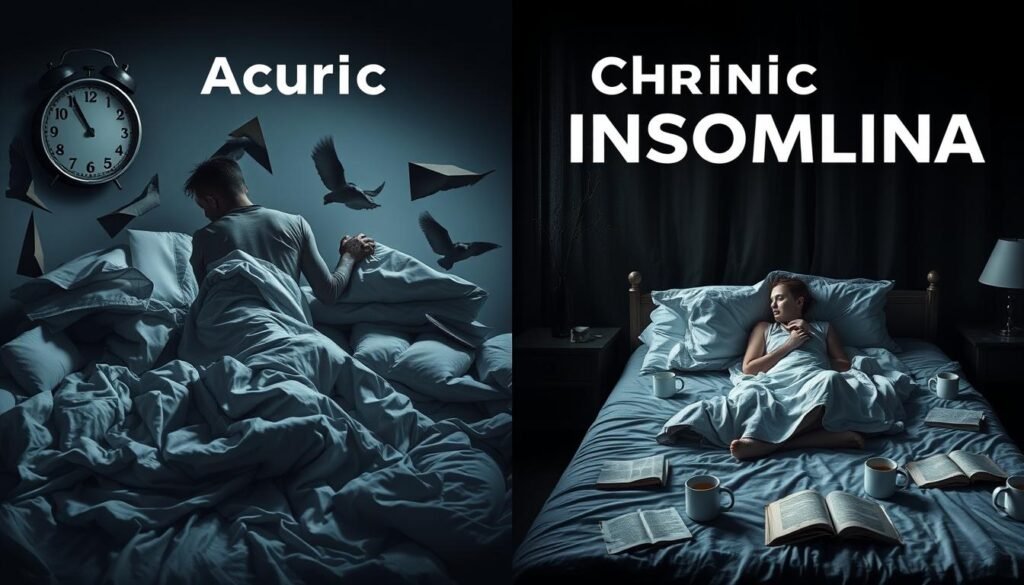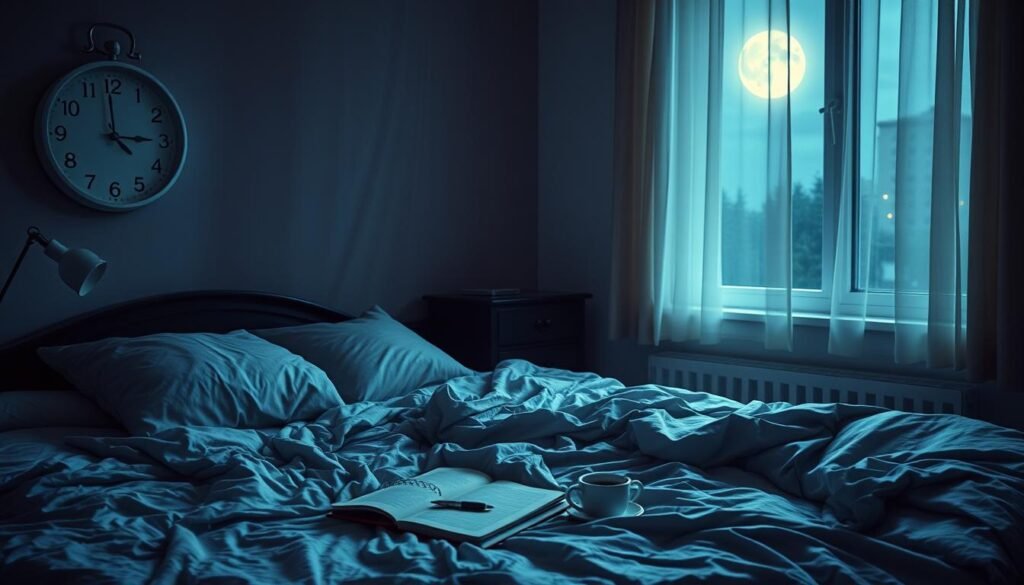About 30% of people will deal with short-term insomnia at some point. This fact shows how common sleep issues are. There are different kinds of insomnia, and they can really affect daily life. Between 10% and 15% of adults have short-term insomnia. Meanwhile, 3% to 5% suffer from chronic insomnia. It’s important to know the different types that exist.
In our detailed sleep guide, we’ll cover the types of insomnia, their symptoms, and how to treat them. Insomnia doesn’t just ruin your sleep. It can also harm your physical and mental health. By learning about the different kinds of insomnia and what causes them, you can work on getting better sleep.
Key Takeaways
- Insomnia affects many, with short-term insomnia being the most prevalent form.
- Understanding the types of insomnia can lead to better management and treatment options.
- Chronic insomnia can have severe consequences on overall health if left untreated.
- Good sleep hygiene practices are crucial for managing insomnia.
- Factors like mental health, environmental issues, and lifestyle can influence insomnia.
Introduction to Insomnia
Insomnia is a common sleep disorder. It impacts about 1 in 3 adults in the United States. People with insomnia have sleep problems like trouble falling asleep or staying asleep.
Many things can cause insomnia. Stress, biological factors, and the environment play roles. Women are more likely than men to suffer from insomnia, showing a gender gap in sleep issues.
About 18 million Americans struggle to get a good night’s sleep. This struggle can last for days. As people get older, the risk increases due to changes in sleep patterns. Other risk factors include a history of depression and not being active.
Insomnia can lead to serious health problems. Those include heart disease, stroke, and diabetes. It can also lead to mental health issues like depression and anxiety.
Common symptoms include feeling sleepy during the day, trouble focusing, and mood changes. To diagnose insomnia, a sleep specialist may need to conduct a study. Treatment often involves changing your lifestyle and improving your sleep habits. Sometimes, medication may be necessary.
| Risk Factors | Common Symptoms | Potential Complications |
|---|---|---|
| Shift work | Daytime drowsiness | Heart disease |
| Aging | Difficulty concentrating | Stroke |
| History of depression | Mood swings | Diabetes |
| Lack of physical activity | Anxiety | Obesity |
What is Insomnia?
Insomnia is a condition that makes it hard for people to fall asleep or stay asleep. It includes symptoms like trouble falling asleep and not feeling rested after sleeping. Most adults need 7 to 9 hours of sleep every night. However, several factors can prevent them from getting enough sleep. This leads to various daytime problems.
Insomnia is more common in some groups than others. Short-term insomnia can happen for days or weeks and is often caused by stress or upsetting events. On the other hand, chronic insomnia lasts for three months or more. It can lead to feeling tired during the day, mood swings, and less productivity.
There are many reasons why people may suffer from long-term insomnia. These reasons include bad sleep habits, eating late at night, health issues, and consuming caffeine or alcohol. By understanding insomnia, doctors can help people find ways to manage it better. The way doctors talk about insomnia has changed, showing they understand it better now.
Some people are more likely to get insomnia. This includes women, older adults, and African Americans. African Americans often take longer to fall asleep and have more sleep problems. Knowing the signs of insomnia is key to getting help early. Over 60% will deal with insomnia symptoms at some point. For more details, check out this insomnia guide.
| Symptom | Description |
|---|---|
| Difficulties falling asleep | Struggling to initiate sleep when going to bed |
| Frequent awakenings | Waking up multiple times during the night |
| Daytime fatigue | Feeling tired or sleepy during the day |
| Mood changes | Experiencing irritability, anxiety, or depression |
What Types of Insomnia are There
There are several kinds of insomnia, like short-term and chronic. Knowing about these insomnia types is key to managing symptoms and getting the right treatment. Identifying the specific kind can guide people to better sleep habits.
Short-Term Insomnia
Short-term insomnia, or acute insomnia, often starts because of stress. This might be due to losing a job, health worries, or big life changes. It usually lasts less than three months. Between 15% to 20% of people experience it yearly, and it’s especially common in older adults. Often, making some changes in daily habits or trying short-term treatments can fix this sleep issue.
Chronic Insomnia
Chronic insomnia is when sleep troubles last longer. It means having trouble sleeping at least three nights a week for more than three months. This long-term issue can really affect someone’s life. It might be connected to mental health, health problems, or using certain substances. About one-third of Americans have similar sleep problems. If insomnia is making everyday tasks hard, it’s important to ask for help. A healthcare provider can offer advice and treatment options. For more information, you can look at professional advice.
Sleep Onset Insomnia
Many people struggle to fall asleep at the start of the night. This is known as sleep onset insomnia. Finding out what causes it and its symptoms can lead to better ways to deal with it.
Definition and Symptoms
Sleep onset insomnia means you stay awake for a long time trying to sleep. Its symptoms include:
- Frustration while lying in bed
- Anxiety about not being able to sleep
- Feelings of exhaustion during the day
- Mood swings and irritability
- Poor concentration on daily tasks
- Loss of libido and coordination
Research shows up to 90% of those with anxiety or depression may have sleep issues, including this type. Long-term sleep problems can really affect your health.
Causes of Sleep Onset Insomnia
Several things can cause sleep onset insomnia. Knowing these can help find relief. Some common causes are:
- High levels of anxiety or worrying thoughts
- Environmental disturbances, such as loud noises
- Consumption of caffeine before bedtime
- Lack of physical exercise
- Use of electronic devices in the bedroom
Women, older adults, and those with chronic health issues are more at risk. However, not everyone experiences insomnia the same way. Doctors look at sleep habits and history for a proper diagnosis.

| Risk Factors | Impact on Sleep Onset Insomnia |
|---|---|
| Anxiety and Depression | Up to 90% may experience insomnia symptoms |
| Environmental Disturbances | Can hinder ability to fall asleep |
| Caffeine Consumption | Makes it difficult to relax before bed |
| Lack of Physical Activity | Reduces overall tiredness at bedtime |
| Use of Electronics | Disrupts natural sleep patterns |
Sleep Maintenance Insomnia
Sleep maintenance insomnia is a big problem for many people. They wake up many times at night and find it hard to sleep again. This leaves them feeling very tired during the day, affecting their life.
Definition and Symptoms
Here are the symptoms of sleep maintenance insomnia:
- Frequent waking during the night
- Struggling to return to sleep for more than 30 minutes
- Restless sleep
- Early morning awakening, where individuals rise 30 minutes or more before planned
- Chronic fatigue and excessive daytime sleepiness
It’s important to know these symptoms to get the right help. They significantly affect everyday life.
Common Triggers
Knowing what causes sleep maintenance insomnia is key to handling it. Common triggers include:
- Stress and anxiety that may disrupt sleep patterns
- Physical discomfort, including pain that hinders restful sleep
- Medication side effects, particularly from certain sedatives or stimulants
- Environmental disruptions, such as noise, light, or temperature changes
Tackling these issues can help improve sleep and lessen insomnia’s impact.
Acute and Chronic Insomnia
Knowing the difference between acute insomnia and chronic insomnia is important for the right treatment and insomnia recognition. While both are sleep issues, they differ in how long they last and their impact on life. This part will explore each type to help manage and treat them better.
Understanding Acute Insomnia
Acute insomnia is short-term, often lasting less than three months. It often comes from stress or big changes in life, like losing someone close, getting a medical diagnosis, or changing jobs or relationships. While the effects of acute insomnia can be strong, they usually go away when the stress does. Research shows it’s more common in women, especially during pregnancy or menopause.
Recognizing Chronic Insomnia
Chronic insomnia means having trouble sleeping for three or more nights a week, for over three months. It can be due to many things, like a bad sleep schedule, not having good sleep habits, mental health issues, or physical problems. Chronic insomnia is seen in both men and women of all ages, but more so in women. It occurs in different ways, like having a hard time falling asleep, staying asleep, or waking up too early and not being able to go back to sleep.

Understanding these differences is key for insomnia recognition. It helps people know when to get help. It also shows how changing lifestyle and cognitive behavioral therapy (CBT) can work as treatments.
| Type of Insomnia | Duration | Common Causes | Prevalence | Treatments |
|---|---|---|---|---|
| Acute Insomnia | Less than 3 months | Stressful life events, changes | More common in women, especially during pregnancy and menopause | Short-term therapy, lifestyle changes |
| Chronic Insomnia | 3 months or longer | Poor sleep habits, health disorders | Affects both men and women of all ages | CBT, medications, lifestyle modifications |
Primary and Secondary Insomnia
Many people struggle with insomnia, which comes in two main types: primary and secondary. Knowing the difference between them helps find the right treatment. Let’s look at what makes each type unique.
Defining Primary Insomnia
Primary insomnia means sleep problems that stand alone, with no clear medical or psychological reason. It affects about 30% of adults, but chronic cases are less common. Those with this condition might find it hard to fall or stay asleep, leading to tiredness and poor performance during the day.
Understanding Secondary Insomnia
Secondary insomnia, on the other hand, is linked to existing issues like health or mental conditions. It impacts around 3% of people. This type can increase anxiety or depression, making it crucial to treat both the sleep problems and their root causes.
Other Types of Insomnia
Insomnia doesn’t look the same for everyone. There are different kinds, such as situational and idiopathic insomnia. Each type has its own challenges. This is why knowing the exact type is key to finding the right treatment.
Situational Insomnia
Situational insomnia comes from certain stressors or changes around us. It can happen due to new jobs, relationship problems, or big events like losing someone close. This kind usually doesn’t last long, often under three months.
During stressful periods, people may find it hard to fall asleep or stay asleep. This can harm their daily life.
Idiopathic Insomnia
Idiopathic insomnia is less common and often starts in childhood. It happens without any clear reason. Those with this condition find it tough to fall and stay asleep, no matter the situation. The lack of a clear cause can be very frustrating.
Understanding these insomnia types is important for the right support and treatment. For more info on insomnia types, their symptoms, and how to deal with them, check out this detailed article.

Effects of Insomnia on Daily Life
Insomnia changes how people feel every day. It harms physical and mental health. This leads to a worse life and more health issues.
Physical Health Consequences
Insomnia badly affects the body. It often means not sleeping well for months. This can cause big health problems. People not getting 7 to 9 hours of sleep face:
- Higher blood pressure, which can lead to heart issues.
- Hormonal changes causing weight gain from altered hunger.
- Lowered immune defense, making sickness harder to fight.
- A greater chance of diabetes for those sleeping five hours or less.
Insomnia leads to serious physical health problems. Addressing it is crucial, as explained in this article on untreated insomnia risks.
Mental Health Impacts
Insomnia also hits mental health hard. It makes people more likely to get depressed. Not sleeping enough hurts one’s ability to make good decisions. Insomnia sufferers may experience:
- More anxiety and stress.
- Trouble focusing, leading to work and personal issues.
Insomnia’s effect on mental health is important. It leads to challenges that affect happiness and health. Knowing these effects helps people work on better sleep habits.
Conclusion
About 30% of adults worldwide struggle with insomnia. This condition makes it hard to start sleeping, stay asleep, or forces early waking. Understanding the different types of insomnia is key for those dealing with sleeping issues. Knowing if it’s short-term, chronic, or another type helps individuals improve their sleep and health.
Many insomnia cases are tied to other medical or mental health issues. These conditions can increase accident risks and lower job performance. Working on these problems through lifestyle changes, therapy, and sometimes meds can lead to better sleep. So, figuring out the specific type of insomnia is critical for getting the right help.
Those dealing with insomnia should get advice from medical experts. A personalized plan can vastly improve life by reducing daytime problems. It allows individuals to start their journey to recovery and well-being.